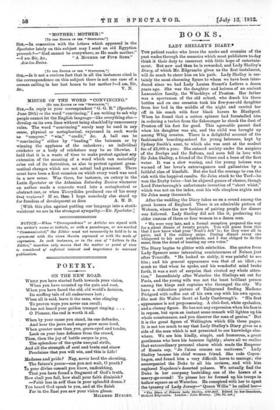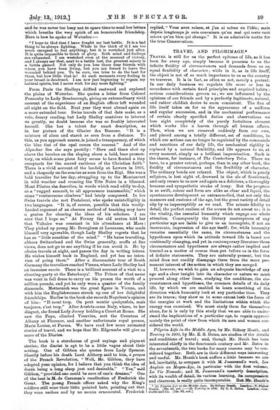BOOKS
LADY SHELLEY'S DIARY.* THE patient reader who loves the nooks and crannies of the past wades through the memoirs which most publishers to-day think it their duty to resurrect with little hope of entertain- ment. But now and then he is rewarded, and Lady Shelley's Diary, of which Mr. Edgcumbe gives us the first instalment,
will do much to cheer him on his path. Lady Shelley is cer- tainly the most charming figure to whom we have been intro- duced since we had Lady Louisa Stuart's Lettere a dozen years ago. She was the daughter and heiress of an ancient Lancashire family, the Winckleys of Preston. Her father was a sportsman of the old school, who drank his three bottles and on one occasion took his five-year-old daughter from her bed in the middle of the night and carried her off in his coach with four black horses to Blackpool. When he found that a cotton spinner had forestalled him in ordering a turbot from the fishmonger he shook the dust of Preston off his feet for good. This agreeable parent died when his daughter was six, and the child was brought up among Whig cousins. There is a delightful account of the fashionable boarding-school for young heiresses, kept by Sydney Smith's aunt, to which she was sent at the modest fee of £1,000 a year. She entered society under the auspices of the Derbys and the Sefton, and soon fell in love with Sir John Shelley, a friend of the Prince and a beau of the first water. It was a slow wooing, and the young heiress was warned of her lover's extravagances and gallantries by a faithful clan of kinsfolk. But she had the courage to run the risk with the happiest results. Sir John stuck to the Turf—he won the Derby twice—but he abjured games of chance, though Lord Peterborough's unfortunate invention of "short whist," which was not on the index, cost his wife sleepless nights and Sir John many thousands.
After the wedding the Diary takes us on a round among the great houses of England. There is an admirable picture of Woburn, where the new fashion of pairing people for dinner was followed. Lady Shelley did not like it, preferring the older custom of three or four women to a dozen men.
" We were very late, and a formal reception prepared the way for a silent dinner of twenty people. You will guess from this that I now know what your 'Noah's Ark' is ; for they were all in pairs, and I the solitary snipe. During dinner every one whispered to his next neighbour, and I was obliged to do the same, from the dread of hearing my own voice."
The Diary begins to glitter with celebrities. She quotes from Lady Spencer some interesting reminiscences of Nelson just after Teneriffe. " He looked so sickly, it was painful to see him; and his general appearance was that of an idiot ; so much so that when he spoke, and his wonderful mind broke forth, it was a sort of surprise that riveted my whole atten- tion." Immediately after Waterloo the Shelleys set out for Paris, and the young wife was not the least brilliant person among the kings and captains who thronged the city. We have a ridiculous picture of Talleyrand feeding Madame Perigord with coffee out of his own cup with his own spoon. / She met Sir Walter Scott at Lady Castlereagh's. "His first appearance is not prepossessing. A club-foot, white eyelashes, and a clumsy figure. He has not any expression when his face is in repose, but upon an instant some remark will lighten up his whole countenance, and you discover the man of genius." But it is the great figure of Wellington which fills these pages. It is not too much to say that Lady Shelley's Diary gives us a side of the man which is not presented to our knowledge else- where. We see him kindly, simple, and humorous, a great gentleman who bore his honours lightly-; above all we realize that extraordinary personal charm which made the Emperor of Russia say, "Je l'aime comma ma maitresse." Lady Shelley became his chief woman friend. She rode Copen- hagen, and found him a very difficult. horse to manage; she accompanied the Duke to all his reviews, and with him explored Napoleon's deserted palaces. We actually find the Duke in her company bestriding one of the homes at a merry-go-round! To please her he formed up his troops in hollow square as at Waterloo. He conspired with her to upset the tyranny of Lady- Jersey-" Queen Willis" he called her—.
'The Diary of Prances Lady Shellsy, 1787-1817. Edited by, her assuidson, Richard Edgcumbe. London John Murray. [10s. 6d. net.]
and-was never too busy not to spare time to send.ber lettere which breathe the very spirit- of an honourable friendship. Ilere is how he spoke of Waterloo-:—
"I hope to God that I have fought my last battle. It is a bad thing to be always fighting. While in the thick of it I am too much occupied to feel anything; but it is wretched just after. It is quite impossible to think of glory. Both mind and feelings ere exhausted. I am wretched even at the moment of victory, and I always say that, next to a battle lost, the greatest misery is a battle gained. Not only do you lose those dear friends with whom you have been living, but you are forced to leave the -wounded behind you. To be sure, one tries to do the best for them, but how little that is l At such moments every feeling in your breast is-deadened. I am now just beginning to regain my natural spirits, but I never wish for any more fighting."
From Paris the Shelleys drifted eastward and explored the plains of Waterloo. She quotes a letter from Colonel Ponsonby to Lady Bessborough, giving an extraordinary vivid account of the experience of an English officer left wounded all night on the field. Next year they went abroad again on amore extended tour. Swiss travels of that date make, as a rule, dreary reading, but Lady Shelley contrives to interest as greatly, no doubt because she was so freshly interested herself. She has a talent for exact description, as in her picture of the Glacier des Bossons. " It is a mixture of alum and starch as seen from a distance. To this, as you approach nearer, is joined a transparency, of which the blue tint of the opal comes the nearest." And of the Alpacher See she says prettily-: "Here and there shot up above the beeches on the sloping shore a bold, bare promon- tory, on which some pious fairy seems to have floated a tiny receptacle for the sacred emblems of the Christian faith." There is a vivid account of the landslip at Lowerz in 1805,
and a rhapsody on the sunrise as seen from the Rigi. She was a hold traveller for her day, struggling up to the Montanvert in wild weather and crossing the Tete Noire in a blizzard.
Mont Pilatus she describes, in words which read oddly to-day,
as' a "rugged summit, to all appearance inaccessible," which some "venturesome climbers" had lately conquered. In her
swiss travels she met Pestalozzi, who spoke unintelligibly in two languages. " It is, of course, possible that this woolly- lieaded exponent of an obscure method of teaching may have a; genius for clearing the ideas of his scholars. I am sure that I hope so." At Ferney the old sexton told her that Voltaire was constant in his attendance at Mass They picked up young Mr. Brougham at Lausanne, who made himself very agreeable, though Lady Shelley regrets that he has so " little sunshine of the mind." " He hates travelling, abhors Switzerland and the Swiss generally, scoffs at fine views, does not go to see anything if he can avoid it. He by choice travels at night, and passes the day in writing letters. He wishes himself back in England, and yet has no inten- tion of going there." After a disconsolate tour of South Cermany the travellers reached Vienna, where Lady Shelley had
at immense sue,cas. There is a brilliant account of a visit to a shooting-party at the Esterbazys'. The Prince of that name was wont in full dress to carry on his person the worth of a Million pounds, and yet be only wore a quarter of the family diamonds. Metternich was the great figure in Vienna, and
with him the Englishwoman struck up one of her delightful friendships. Earlier in the book she records Napoleon's opinion of him '"Il meut trop. On pent mentir quelquefois, mais toujours, c'est trop." After Austria came Italy, where, to her disgust, she found Lady Jersey holding a Court at Rome. She saw the Pope, climbed Vesuvius, met the Countess of Albany at Florence, and another unfortunate royal person, Marie Louise, at Parma. We have read few more animated stories of travel, and we hope that Mr. Edgeumbe will give us more of the Diaries.
The book is a storehouse of good sayings and piquant stories; the diarist is apt to be a little vague about their setting. One of Gibbon she quotes from Lady Spencer.
Shortly before his death Lord Althorp said to him, d. propos of the French Revolution, Well, Mr. Gibbon, they. have adopted your opinion, for I believe that you think the.idea of death being a. long sleep just and desirable." " Yes," staid Gibbon, "provided one could be sure of one's dreams." One of the best isk.M. de Caraman's recollection of Frederick the Great. The young French officer asked why the. King's soldiers still wore their little pointed hate, pointing out that they were useless and by no means ornamental. Frederick replied, " Vous area raison; •et j'en ai mbrae en rides(); mais deptils longtemps je stile convainou qu'un mal qui rests vaut mieux qu'un bien qui change." It is an admirable motto for the true Conservatism.







































 Previous page
Previous page